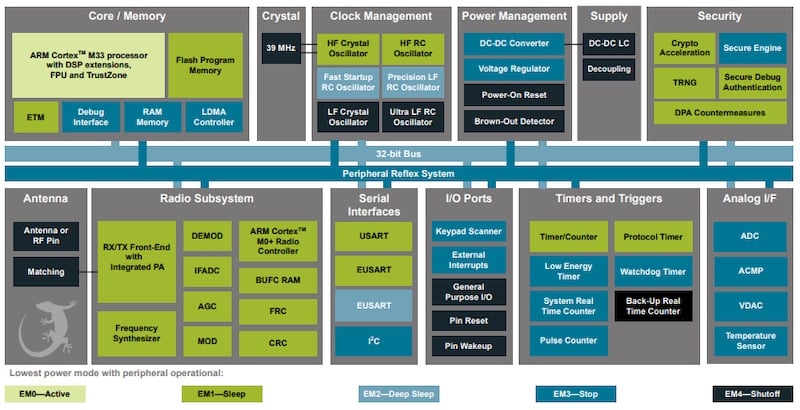Silicon Labs and Arduino Partner to Democratize Matter
Matter-over-Thread applications are now more accessible to Arduino's developer community of 33 million.
Matter aims to unify the fragmented IoT ecosystem, offering a universal language through which an array of devices can communicate seamlessly, regardless of the manufacturer. The promise of this protocol is to simplify IoT development, making smart technology more interoperable and accessible to everyone.

Designers can now develop Matter-over-Thread applications using the Arduino IDE on the EFR32MG24 MCU.
Recently, Silicon Labs and Arduino announced a new phase in their partnership aimed at democratizing the development of Matter-enabled IoT devices. The two companies will do this by integrating the Matter protocol into the Arduino ecosystem.
Silicon Labs and Arduino Show Support for Matter
Silicon Labs and Arduino unveiled Phase 1 of the collaboration at CES 2024. This phase introduced a Matter-tailored Arduino library and an Arduino core for Silicon Labs microcontrollers, bringing these solutions into the Arduino integrated development environment (IDE).
![]()
A rendering of the Silicon Labs Arduino Nano.
The partnership's second phase is geared toward the launch of a new development board within the Arduino Nano family. This board, based on the Silicon Labs MGM240 module, is designed to further streamline IoT development.
This partnership aims to significantly lower the barrier to entry for developing Matter-over-Thread devices by integrating Matter with Arduino's ecosystem. A wider range of both hobbyist and professional developers can now easily create secure, energy-efficient, and powerful IoT devices using the Matter software libraries for Arduino alongside hardware like the xG24 Explorer Kit and the SparkFun Thing Plus Matter MGM240P development board.
MGM240 Module: The Heart of Arduino's New Board
The new Arduino board will be based around the Silicon Labs MGM240 module, which relies heavily on Silicon Labs' EFR32MG24 SoC. The SoC provides the MGM240 module with a 32-bit, 39-MHz Arm Cortex-M33 processor, including DSP extensions and a dedicated floating point unit (FPU), along with 1,526 kB of Flash memory and 256 kB of RAM.

Block diagram of the MGM240P module.
The device is built around a high-performance 2.4-GHz radio subsystem. The radio subsystem operates with a built-in antenna multiprotocol radio, supporting 802.15.4 and BLE 5.3. With a sensitivity of -106.0 dBm at 250 kbps using O-QPSK modulation, the module can detect and process very weak signals—a crucial feature for maintaining connectivity in environments with high levels of interference or over extended ranges. Furthermore, the module can deliver up to 19.9 dBm output power, ensuring that signals can be transmitted over long distances or through obstacles.
Energy efficiency is also a critical aspect of the MGM240 module, with features designed to minimize power consumption. The module boasts an EM2 DeepSleep current of just 1.3 μA and an active mode (EM0) current consumption of 33.4 μA/MHz, making it suitable for battery-powered applications where longevity is paramount.
More Accessible IoT Development to Come
Silicon Labs and Arduino hope their collaborative efforts will catalyze a wave of innovation across various sectors, including smart homes, industrial IoT, and educational projects. The convergence of Arduino's user-friendly platform with Silicon Labs' hardware, all underpinned by the universality of the Matter protocol, may signify a major leap forward for the embedded engineering community.
The collaboration will focus on two key areas:
- Making Matter development easier for makers: Silicon Labs will provide Matter-certified development kits and tools that make it easy for makers to add Matter support to their designs. Arduino will offer a variety of educational resources and tutorials to help makers get started with Matter development.
- Expanding the Matter ecosystem: Silicon Labs and Arduino will work together to promote Matter adoption among the maker community. This will help to grow the Matter ecosystem and create a wider range of Matter-compatible devices.
The collaboration is expected to benefit the maker community in several ways:
- Makers will have easier access to Matter development tools and resources: This will make it easier for makers to add Matter support to their designs and create new Matter-compatible devices.
- Makers will be able to learn about Matter from experts: Arduino's educational resources and tutorials will help makers get started with Matter development and learn about the benefits of the new standard.
- Makers will be able to contribute to the growth of the Matter ecosystem: By developing Matter-compatible devices, makers can help to create a wider range of products that work seamlessly together.
The collaboration between Silicon Labs and Arduino is a significant step forward in the development of Matter. By making Matter development more accessible to the maker community, Silicon Labs and Arduino are helping to accelerate the adoption of the new standard and create a more interoperable smart home.
All images used courtesy of Silicon Labs.







